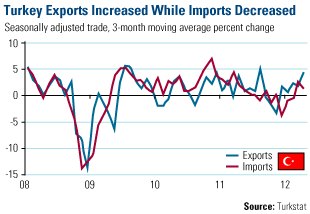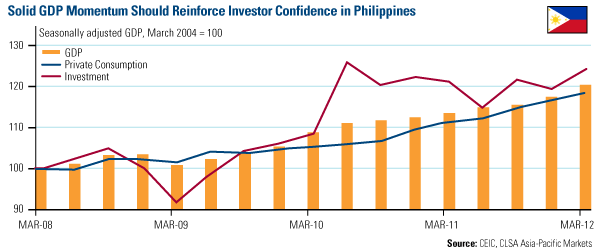Emerging Markets Radar (June 4, 2012)
Strengths
- The Philippine’s GDP increased 6.4 percent year-over-year in the first quarter this year, greater than estimated, and exceeded the previous quarter’s revised 4 percent. In Korea, industrial production rose 0.9 percent month-over-month in April, the biggest increase in three months, and it saw the Consumer Price Index (CPI) rise 2.5 percent in May, holding at a 21-month low.
- Thailand’s CPI for May rose 2.53 percent year-over-year, in line with expectations.
- Hunan Province in central China announced a provincial investment plan totaling RMB 4.2 trillion for 12th 5-years, or about Rmb 800 billion a year.
- China’s State Council has announced it will provide RMB 26.5 billion in subsidies to promote energy-efficient appliances, one of a series of stimulus measures that the market is expecting from the Chinese government.
- Turkey’s trade deficit was much better than expected in April, down to $6.6 billion from $9.1 a year ago. Exports have been resilient in the first four months of 2012, rising by 10.9 percent over the same period a year ago. The eurozone is Turkey's largest partner, and as a result of weaker demand in the region, exports to eurozone countries fell by 6.1 percent year-over-year in January through April. On the other hand, exports to North Africa rose by 63.3 percent (after falling by 23.9 percent in 2011), and exports to the Middle East increased by 35.5 percent.

Weaknesses
- China’s official PMI for May was 50.4 versus the estimate of 52; the reading was also the lowest in the year. The new order index dropped 470 basis points to 49.8 percent, which doesn’t bode well for productivity in the next few months if the downtrend is not stopped. The HSBC final China flash PMI was 48.4 versus 49.3 in the previous month, a consecutive seventh month below 50. A PMI below 50 indicates industrial activities are contracting. HSBC China flash PMI tells more about export contraction at the moment.
- Hong Kong retail sales grew 11.4 percent in April versus estimate 16.4 percent, disappointing the market.
- Korean exports fell 0.4 percent year-over-year in May, exceeding estimates but still declining for a third month.
- The European Central Bank said that Hungary’s amended draft law still fails to address a number of previously highlighted concerns over central bank independence and executive powers of monetary council.
Opportunities
- The Russian manufacturing sector gained further growth momentum in May, with PMI remaining above 50.0 for the eight month running, rising to 53.2 in May. Output and employment are higher, while inflationary pressures remain relatively weak.
- The Philippine’s GDP went up 6.4 percent in the first quarter, illustrating the fact that infrastructure investment and domestic demands are driving economic growth and corporate profits.

Threats
- With China PMI in May weakening and key sub-indices reflecting weak demand in the economy, this increases the probability of further policy relaxation and accelerated approval of infrastructure projects.
- Czech PMI fell to 47.6 from 49.7 in April, pointing to downside risk in coming quarters. HSBC survey data and anecdotal evidence suggested weak demand from both domestic and external markets, linked to the crisis in Western European economies.











